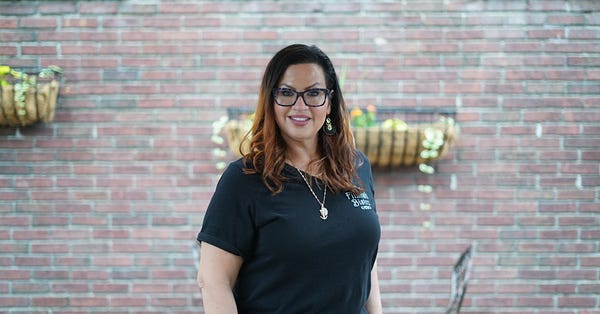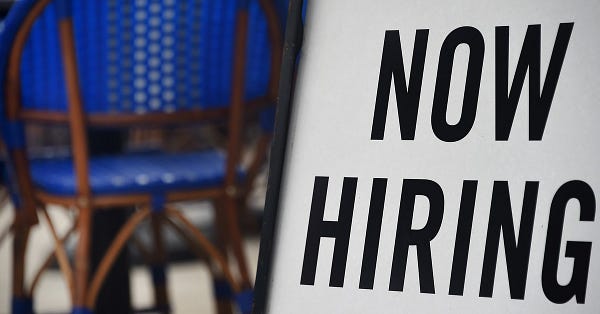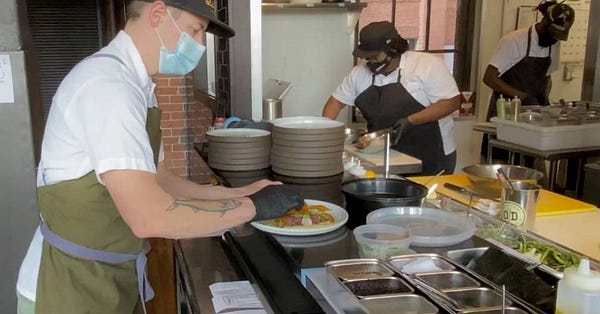Why should we go back to a job that doesn’t value or pay us enough to live?
Is it a worker shortage or is it a strike?
Hello. I’m going to try a new little promotion type thing here. Anyone who subscribes for the yearly price of $69 starting today I’ll send a copy of one of the two Hell World books. Offer good until it gets out of hand. Email me and we’ll sort it out on the side without Substack being involved if you want to take advantage.
Today we’ll hear from service industry workers around the country about why they really aren’t going back to work. (They’re lazy and living high on the hog under Chairman Joe’s Communist America obviously).
Please also check out these more recent piece on the same topic.




First let me set the table a little bit so to speak, something I’m also well accustomed to doing as a job ($2.33 an hour, no vacation, no benefits, shut the fuck up if you don’t like it).
Here. Check out this shit:


“Sandra Weise, owner of the Finnish Bistro in St. Paul, recently announced that she would begin closing 4.5 hours early every day because she can’t find enough workers to keep the doors open,” the Minnesota Reformer reported.
Weise is skeptical that people are really looking for work, even though they have to check a box saying they are looking for work in order to get benefits. “People have learned to hustle it,” she said.
“I’m down a half a million dollars,” Weise said. “That is my life savings. That is everything I’ve worked for. … Rain, sleet, snow, even COVID didn’t close my business. But unemployment did.”
She’s barely got the half million dollars she had saved up left over. Can you imagine?
It occurs to me that if your restaurant closes because you can’t hire anyone for the shit pay you’re offering then maybe you should go get a job at one of the many other restaurants that also can’t hire anyone?
Here’s this one too:


The fucking balls to ask how much a job pays.
Another one:


And another one:


As I wrote in here recently: “One common thread among these stories is that they are almost all devoid of any worker voices. The premise that no one wants to work because the government is doing a socialism too much is not interrogated at all and passed along as true by many of the journalists covering the story.”
From a “standards of journalism” pov this type of thing where you take the word of the owner without checking with any workers is the opposite of objective and quite literally biased but it doesn’t register as “officially biased” under the perverted terms this dumb profession operates under. It’s similar to how the media at large reports on police issues. We usually only hear from the powerful party in any given conflict. Workers much like victims of police are considered de facto untrustworthy specifically because of their exploited station, but the very clear interests of the more powerful party is passed along as neutral and that’s fine.
I’ve said this all a million times in here but repeat it with me again: Journalists are cops. The ones with salaried jobs at legacy outlets anyway.
“If anyone bothered to ask potential workers who aren’t seeking out restaurant work right now you might hear a slightly different framing,” I wrote the other day. So let’s do that.
If you missed this one the other day it was “some good reporting” imo.


Is it a worker shortage or is it a strike?
by Em Cassel
Over the past month or so basically every major news outlet in the nation has published a variation on one extremely misleading story. It goes like this: there’s a restaurant worker shortage. As pandemic restrictions ease, the pieces explain, businesses are staffing back up to full capacity, and yet no one seems to want to work. The restaurant owners quoted—and they’re almost always exclusively the owners, not the former servers and bartenders and dishwashers hesitant to return—explain over and over that people won’t come back to the service industry when unemployment benefits are too good.
It’s hard not to feel for them. The existence of a somewhat decent social safety net for like five minutes in this country has upturned these restaurateurs’ entire business model of exploiting a desperate and readily replenishable labor force.
What these owners don’t talk about is that the workers they’re trying to woo back are the very ones who experienced the unceremonious mass layoffs and open-ended furloughs they dished out as the pandemic set in and then dragged on throughout 2020. There were often complete breakdowns in communication followed by months-long uncertainty over the existence of people’s jobs. It wasn’t unusual to have management and ownership disappear for weeks or months and then reappear to tell the staff the restaurant was going under.
Pandemic-related furloughs and layoffs and closures weren’t unique to restaurants, but something that is somewhat specific to the industry is that for decades its owner class has been able to underpay and overwork employees under the guise of being “like a family.” Covid showed their hand: Maybe we’re a family, but that doesn’t mean you have a safe or stable position here when it becomes inconvenient for me to have to pay you. A lot of families are dysfunctional after all.
It’s why former executive chef Brian Carson said the current situation is essentially a strike. “You fired these folks a year ago,” he said, “and now you’re mad that they don’t want to come back and do the same [tough] job for the same crappy pay?”
Last week, after reading the thirtieth or so story about how no one in this country understands the value of hard work anymore or whatever, I started asking servers and bartenders and delivery drivers and baristas why they would say they've been taking their time returning to the industry (if they plan to do so at all). Must have been one of those good old-fashioned journalistic hunches. Turns out there are lots of reasons that even those who’ve spent a lifetime in hospitality now wonder if it’s worth it; unemployment benefits are pretty far down the list.
There are people like Kimberly Wolf, a mom of two and a barista for more than a decade, who started her career at Starbucks and eventually became a “super pricey hipster coffee shop barista.” It was work she genuinely liked, seeing people first thing in the morning and being the first interaction they had that day. She’s the kind of person who has a whole set-up at home for their morning coffee; she understands the significance of the ritual.
Kimberly kept working during the pandemic, making $10.50 an hour at the peak. The owners conducted a “soft lay off” of her coworkers once Covid hit, making her one of only two employees. She showed up to a near-empty shop every day and sanitized everything with bleach every 30 minutes. Management didn’t set up any sort of online tip jar; it was a regular who made a GoFundMe for the staff.
“When the owners found out, they made him take it down because they were concerned that they would face some sort of legal repercussions,” she says.
A few weeks later, Wolf was fired after she liked a “sassy” tweet about her employer that came from the previous assistant manager, she said. “Needless to say, this was devastating as a single mom of two kids during a fucking pandemic.” She qualified for unemployment, which carried her through half of the year, and made the decision that she “absolutely can’t go back to that.” Instead, she’s taking out a bunch of loans and going back to school to be a librarian.
“I know capitalism is inescapable in this fucked up country but I just can’t submit myself to that kind of treatment and disrespect anymore for such little pay,” Wolf said. “I would rather drive myself into debt pursuing something I love and that I believe helps people in all communities than go back to that.”
“The thought of never working behind a bar ever again fills me with joy,” said Henry, who spent more than two decades working in hospitality before the pandemic. He’s enrolled in a nursing program now, “so I never have to go back.”
Henry, who’s worked everywhere from corporate chains to mom and pop pizza shops and has bartended all over the place along the way, says his feelings towards the industry changed slowly. “But once the scope of what we were all experiencing became clearer, I started to realize that restaurants and bars wouldn't really feel the same way again, at least for me.” He pulled a few brewery shifts last fall and realized his “capacity for niceness in the face of difficult customers” (which he admits might not have been super high to begin with) was completely gone. He thinks a career in nursing, though the industry has its problems like any other, will be better for his health and offer greater stability.
Some people just took a look at their experiences and wondered if the industry was really where they wanted to be. Jason Kornelis got laid off due to Covid in March 2020 and used the boosted benefits and unexpected downtime to build a little home studio and pursue his interest in voiceover work, building a career from home as a freelancer.
“It hasn't quite paid off yet, but I'm going to hold out as long as I can,” he said. After a year of being his own boss and making his own schedule and enjoying the freedom and agency that comes with it, he’s struggling to find a reason to go back. “It feels a little crass to call a global pandemic an ‘opportunity,’ but having financial support and infinite free time really opened things up for me.”
And this is to say nothing of the servers who did continue working. They didn’t get to sit at home collecting a paycheck in sweatpants and pivot to Zoom over the last year; they strapped on PPE and went out to deal with Covid-denying customers. Can you blame any of them for considering a change after running that gauntlet?
One is Ryan Wilkins, a lifelong industry worker from South Dakota who went back to work as a cook during the pandemic last summer, “the busiest and most horrible time” he’s experienced in his career.
He put in a five weeks notice at the end of September, then got Coronavirus in the second to last week. He’s been jobless since the end of October. “And even with all the Covid stuff going on my job was still like, are you sure you can't come in? We really need you.”
“To be honest, I don't want to [go back],” he says. “And I'm definitely going to look around for jobs in any field other than restaurants. But the trouble is that it is the only thing I've ever done. And I feel like at the end of the day I will end up going back … hopefully using the worker shortage to get a big raise and only come back for part time. And then maybe eventually find something else.”
It’s not just the possibility of being let go at a whim, or the bosses who don’t care if you have Covid, or the unshakable feeling that the industry will never be the same that’s making people rethink things. The past year has also given a lot of people time to reflect on problems that have been lingering under the surface in the industry for years.
“Last summer a lot of people started opening up about the toxic work environments of local restaurants, and I think that is another huge contributor to people hesitating to go back,” a Twin Cities server who asked to remain anonymous told me. She’d actually planned to return to the industry on the side—serving and bartending wages are hard to pass up—but recently found out there were allegations of sexual assault against the owner of the place where she was about to start.
Henry noted that the bulk of his bartending work was focused on craft beer, which is going through its own long-overdue, nationwide reckoning right now. “Just another part of why I desperately wanted out,” he said.
Other, subtler, quieter industry-wide shifts have servers concerned. In the Twin Cities, several servers noted that the restaurants where they used to work have done away with tipping and now charge a service fee—pooling and distributing those tips in a way that essentially amounts to a pay cut.
One former server who goes by the handle @garbagefuckusa and has “been trying to advocate for industry employees and making a lot of people mad,” has seen owners reworking the way employers are paid more and more. Surprisingly, it doesn’t tend to work out in their favor. Lots of top-tier restaurants fired or laid off their entire staff last year, then “invited” people to apply to get their old jobs back as they readied to reopen. And in some cases, “when they had people reapply for their jobs, they did it under a different tipping/pay structure,” he said.
“We know that by state law owners/managers cannot touch what is considered a direct tip,” he said. “So to get around it they essentially fired everyone, instituted a higher hourly rate (which is good!), but charge a service fee equal to what is usually 18-20% depending on the restaurant.”
Garbage Fuck walks through the back of the napkin math: If you work six hours as a server and sell $1,500, an 18% tip average nets $270 plus your hourly. If restaurants are going to do away with that and pay $30 an hour—no actual tipping—you’re looking at a substantial pay cut.
Garbage Fuck’s other industry-bear-poking tactic is to post screenshots of the PPP loans big restaurants in town were able to land, despite the fact that they laid off their entire staff and didn’t open up for the entirety of the pandemic. Some of these places got a quarter-million or more… where’d that money go if not to workers on payroll, as it was intended to?
Despite media coming together to push the pro-owner narrative, it’s clear that there’s a whole bunch of reasons to be skeptical that restaurant workers are simply too lazy and entitled now to ever want to work again. Workers somehow now have even less trust in owners than they did pre-pandemic, which is understandable, because they aren’t being any more transparent or forthright with them than they were before Covid changed the landscape.
“The way owners have handled the pandemic made it more clear than ever that they don’t care about their employees,” adds another Twin Cities server. “The industry runs off the exploitative narrative that we’re all family and we help each other out, but they can’t keep up that charade now that we’ve seen how they treat us in crisis.”
“It makes me sad because I spent so much time at it, and developed some really special relationships out of it, but to go back to that would just ruin me I think,” Wolf says of her career in coffee. “So many of my friends who are also working in the service industry are feeling the same way. Why should we go back to a job that doesn’t value or pay us enough to live?”
Em Cassel is a writer and editor based in Minneapolis, where she was the first (and last) female editor in chief of City Pages (RIP). You can follow her on Twitter here.
While I got you here please also check out what I thought was just a great piece by Greg Grisolano in Popula this week about a devastating hurricane that leveled Joplin, Missouri in 2011. It starts like this:
My concern is, if I begin with the dildos, it’s gonna ruin the rest of it. So at the risk of being accused of burying the lede, I’m not going to start off with how the Joplin Tornado made it rain dildos on Duquesne, Missouri.
I’ll start with a memorial.
Will Norton was probably one of the first casualties of the deadly EF5 tornado that struck Joplin on May 22, 2011. He was in a car with his father on the southwest side of town, near where the funnel must’ve dropped. He’d just received his high school diploma, and he was a “YouTuber” in the days when that was still a fun and innocent thing for teens to do. His body was sucked out of the sunroof of an SUV. They found him three days later in a pond not far from 26th and Schifferdecker Road. My wife’s dad went to high school with Will’s dad. My wife grew up playing at the Norton house.
Will was likely one of the first victims, and the first that we knew personally. He wouldn’t be the last.
The next one would be Dorothy Bell, an elderly woman who lived with her son, my friend David, at 27th and Jackson Avenue. Their home is four blocks due west of St. John’s Hospital. The same hospital that the Weather Channel’s Mike Bettes would break down and cry in front of on live TV later. The same hospital where my wife’s mother, my mother, and my wife would all work, separately.
Dorothy and David were at home when the sirens went off. They didn’t have a basement, so they sought refuge in the interior hallway. The vortex completely flattened their house. Dorothy had a heart attack. It took David a while to dig himself out of the rubble and longer still to find his mother. By then it was too late. Fox News watchers might recall their names, because David ended up on Fox News, after Dorothy’s body went missing in one of the temporary morgues for a week. Maybe “went missing” isn’t the right word. They lost the body.
Read the rest here.
Ok bye for now. The next issue will be paid-only.





Hi Luke, just became a paid subscriber, so i am finding some value in your words. thanks for that. I was in the industry since 1997. I was one of those crazy corp burn-outs who used a severance package to go to cooking school. Well, the industry finally broke my heart for good. I started fresh, here riclexel.substack.com and on multiple side-hustles.
I am writing a series on this topic here https://riclexel.substack.com/p/what-is-really-stopping-workers-from
Keep stringing those words together, they make sense sometimes!
Out-patient healthcare is another industry whose employees went from their pre-COVID treated-just-barely-above-being-completely-crushed to facing slashed staff, longer hours, reduced pay, massively increased workloads, and significantly greater risks during COVID (and through to today). I'd love to suggest somebody to talk to about it but only have the stories family has told me. Anyway, thanks as always.